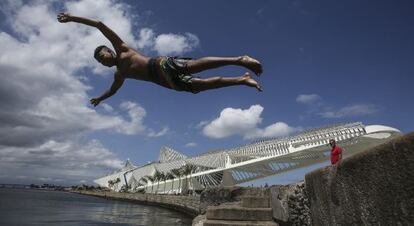Rio finalizes preparations for its crisis-hit Olympics
Brazil’s difficult economic situation is having a major effect on plans for the Games

Employees at the Rio Olympic Games Organizing Committee are practically forbidden from printing out documents, while, contrary to the body’s promises, more than 10,000 of the athletes staying in the Olympic City will have no television sets in their rooms. At the same time, the swimming pool area will now have no roof and many of the facilities for competitions will be temporary installations. The Rio de Janeiro Olympic Games, which are scheduled to be held from August 5 to 21 this year, will reflect the reality of a country grappling with economic recession, unemployment and high inflation.
We are doing the Games with the money we have, without leaving the government or society any debts” Mario Andrada, spokesman for the Rio Olympic Organizing Committee
The joy the country felt in 2009 when Rio beat Madrid to become the host of the 2016 Games has gradually worn off. A year after the decision, Brazil’s GDP was rising by 7%, but today the country is facing its worst recession in the last 25 years. Mario Andrada, spokesman for the Rio Olympic Organizing Committee, has said on several occasions that: “We are doing the Games with the money we have, without leaving the government or society any debts.”
Rio Mayor Eduardo Paes says he has undertaken a crusade against overspending and promises to not “embarrass” Brazil with a legacy of infrastructure that cannot be put to good use after the Games. The 2014 World Cup left behind several white elephants – multi-million-dollar stadiums, such as the one in Brasilia, that were turned into state government buildings so they would not remain empty. “As an event, the World Cup was a success,” the mayor said at a conference with business leaders in May after saying that the World Cup had been “a lost opportunity.” “But what image did we project? One that said we are a banana republic where the world spends too much on stadiums and does not finish them on time?”
Efforts to save money – the committee has promised to reduce costs by at least 10 percent to stay within the budget – do not, however, mean the Games will be a cheap event. The $8.4 billion invested so far in preparing South America’s first Olympics will exceed what it cost to host the World Cup in 12 cities by 43%.
Expenses are high because most of this money is not being used to build facilities – the majority of which are almost finished – but to improve the city’s weak infrastructure. The budget accounts for fulfilling old promises such as the construction of a subway line from downtown Rio to Barra da Tijuca, the main events area, but the government is still seeking credit loans in order to build it.
Plans also include the cleaning up of Guanabara Bay. Despite that fact that $2.3 billion has already been spent over the last 20 years, the bay is getting ready to host the sailing competitions with tons of fecal matter, which could be infected with viruses, floating around in the water.
“Here we already said it was more of a management problem than lack of money,” says Pedro Trengrouse, an expert on law, management and sports marketing. “There are a lot of promises and few results. That’s not news. That already happened at the World Cup and at the Pan-American Games.”
Trengrouse believes that cost control is more the result of following an obsolete planning model for the Games than a consequence of the economic crisis. “The Olympic Games are facing a world crisis. Fewer and fewer democratic nations are willing to accept these costs. That’s why we see countries such as China, Qatar and Russia, where people have little say in decisions, beginning to take more space at these events,” Trengrouse explains. “If you ask them, people say they do not want the Games.”
“Right now, sustainability is the key element in the Olympic movement,” says Emilio Fernández, a lecturer at the Olympic and Sports Studies Center at Barcelona Autònoma University. “The subject of organizing less expensive Games, more respectful of the environment and definitely more sustainable, will become more consistent in the next few years because that’s enshrined in the spirit of the times but, mostly, because the International Olympic Committee has already declared it so in its 2020 Agenda.”
English version by Dyane Jean Francois.
Tu suscripción se está usando en otro dispositivo
¿Quieres añadir otro usuario a tu suscripción?
Si continúas leyendo en este dispositivo, no se podrá leer en el otro.
FlechaTu suscripción se está usando en otro dispositivo y solo puedes acceder a EL PAÍS desde un dispositivo a la vez.
Si quieres compartir tu cuenta, cambia tu suscripción a la modalidad Premium, así podrás añadir otro usuario. Cada uno accederá con su propia cuenta de email, lo que os permitirá personalizar vuestra experiencia en EL PAÍS.
¿Tienes una suscripción de empresa? Accede aquí para contratar más cuentas.
En el caso de no saber quién está usando tu cuenta, te recomendamos cambiar tu contraseña aquí.
Si decides continuar compartiendo tu cuenta, este mensaje se mostrará en tu dispositivo y en el de la otra persona que está usando tu cuenta de forma indefinida, afectando a tu experiencia de lectura. Puedes consultar aquí los términos y condiciones de la suscripción digital.









































